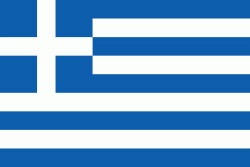Piraeus Prefecture (Nomós Piraiós)
Piraeus Prefecture (Νομός Πειραιά or Νομός Πειραιώς) was one of the prefectures of Greece. Created in 1964 as a separate Prefecture (Νομός) and after the dissolution of the prefecture in 1972 was one of the 4 prefectures (Νομαρχίες) of Attica prefecture, and from 1994, part of the Athens-Piraeus super-prefecture (1994–2011). The capital of the prefecture was Piraeus. As a part of the 2011 Kallikratis government reform, the prefecture was abolished, and its territory was divided into two regional units: Islands and Piraeus.
The prefecture covered the south-western part of the agglomeration of Athens, several islands in the Saronic Gulf (Salamis, Aegina, Agkistri, Poros, Hydra, Dokos, Spetses, Spetsopoula), Methana and Troizina on the Peloponnese peninsula, and the islands of Kythira and Antikythera south of the Peloponnese. An indication of the geographical diversity of the prefecture was the stark difference in population density between its seven mainland municipalities in the Athens urban area, which have 9,244.2 inhabitants/km2, and its detached outlying areas, which average only 85.83 inhabitants/km2 (and most of these on Salamis Island, at 395.40/km2, while the far-outlying parts have only 47.80/km2).
The prefecture covered the south-western part of the agglomeration of Athens, several islands in the Saronic Gulf (Salamis, Aegina, Agkistri, Poros, Hydra, Dokos, Spetses, Spetsopoula), Methana and Troizina on the Peloponnese peninsula, and the islands of Kythira and Antikythera south of the Peloponnese. An indication of the geographical diversity of the prefecture was the stark difference in population density between its seven mainland municipalities in the Athens urban area, which have 9,244.2 inhabitants/km2, and its detached outlying areas, which average only 85.83 inhabitants/km2 (and most of these on Salamis Island, at 395.40/km2, while the far-outlying parts have only 47.80/km2).
Map - Piraeus Prefecture (Nomós Piraiós)
Map
Country - Greece
 |
 |
| Flag of Greece | |
Greece is considered the cradle of Western civilization, being the birthplace of democracy, Western philosophy, Western literature, historiography, political science, major scientific and mathematical principles, theatre and the Olympic Games. From the eighth century BC, the Greeks were organised into various independent city-states, known as poleis (singular polis), which spanned the Mediterranean and the Black Sea. Philip II of Macedon united most of present-day Greece in the fourth century BC, with his son Alexander the Great rapidly conquering much of the ancient world, from the eastern Mediterranean to the North Western parts of India. The subsequent Hellenistic period saw the height of Greek culture and influence in antiquity. Greece was annexed by Rome in the second century BC, becoming an integral part of the Roman Empire and its continuation, the Byzantine Empire, which was culturally and linguistically predominantly Greek.
Currency / Language
| ISO | Currency | Symbol | Significant figures |
|---|---|---|---|
| EUR | Euro | € | 2 |
| ISO | Language |
|---|---|
| EN | English language |
| FR | French language |
| EL | Greek language |
















